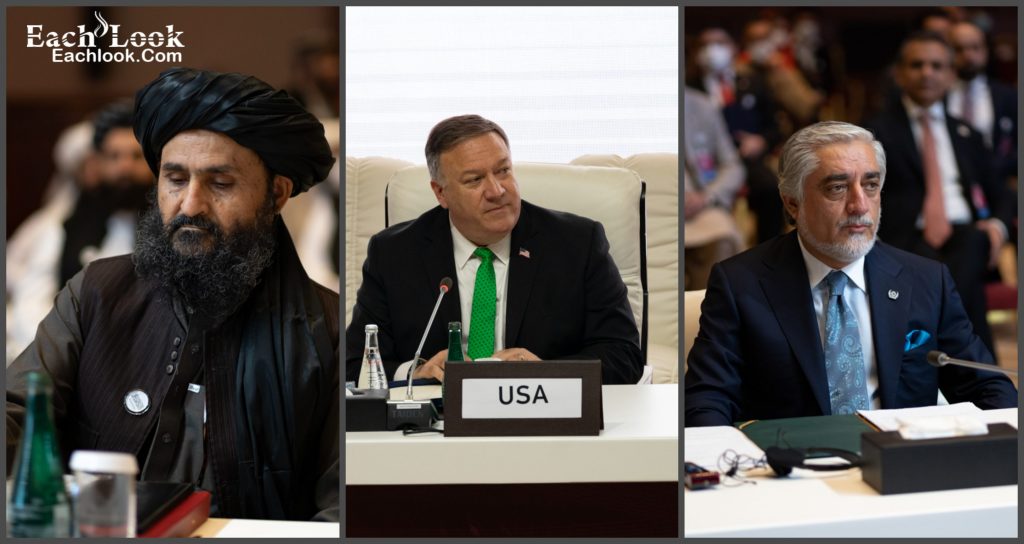Afghan government representatives and Taliban contributors gathered on Saturday for historic Intra-Afghan peace talks aimed at ending decades of warfare and combats in Afghanistan that has killed tens of hundreds of human beings.
Delegation from the Taliban and Afghan government are meeting in Doha, Qatar for Intra-Afghan peace talks.
Hopefully it will bring an end to the 19 year old conflict in the region and people will enjoy some relief there.
Intra-Afghan Talks Explained
Talks between the warring sides were set to began in March but have been repeatedly pushed back because of a disagreement over a prison talk and Covid 19 pandemic Situation.
These talks are the outcome of a landmark agreement between Taliban and the United States Of America in February.
It outlined how the Afghan government, which was not a party in the agreement will release the 5000 Afghan prisoners in exchange of 1000 Afghan security personals.
This is the clause C of part 1 in the agreement. This condition was cleared in 2020 when both sides announced that the final batch of prisoners have been released.
The meetings’s main focus is on achieving a permanent ceasefire, the political future of Afghanistan and social equality,
However, while Intra-Afghan talks might raise the prospects of peace, many Afghans including women and girls how much is at stake and they are worried.
When the Taliban were in power from 1996 to 2001, women were banned for working and going to schools. They were confined in their homes.
After the US toppled the Taliban, three million girls went back to schools.
Also Read This:
Trump Declares ‘Peace Deal’ Among Bahrain and Israel
Trump Nomination For Noble Peace Prize 2021, How Far Is It Controversial?
Things To Keep In Mind On Table
Afghan women activists are concerned that a peace deal with Taliban may end the conflict, but it might cost the women their right to work and engage in civil, political and economical activities.
Women in Afghanistan, specially in Kabul are now enjoying the freedom to work, get education and perform the other social activities of a normal life due to the strong hold of Afghan Government in the Capital.
Afghan constitution is also at the stake and might be amended if a power sharing agreement is achieved as Taliban will try to impose the “Shria Law” according to the teachings of Islam.
Taliban are not looking willing to be a part of the current democratic political set-up.They have cleared at various moments that they want to impose the Islamic system of Shria Law as governance.
In the first six months of 2020, almost 1300 civilians including women and children have been killed in different combats between government and Taliban.
Afghanistan finally have the opportunity where they can resolve their internal issue and cqan start a rapid development of the suffered area and to stand among the rapidly growing economies of the world by having a Peace deal.
Both sides have to negotiate looking at the all type of people living in the country, so that peace could be achieved without disturbing the running system.
Speakers from the concerned parties include chairperson for Afghanistan High Council for National Reconciliation Dr. Abdullah Abdullah, Deputy Leader of Taliban Mullah Abdul Ghani Baradar and the United States secretary of state Mike Pompeo.
An introductory session was held at Saturday, While the main starting session of the Peace talks will be started on Monday.
Also Read This:
Pakistani-American Shahid Khan Featured In Forbes Richest List
Ertugral Actor Engin Altan Confirmed His Visit To Pakistan- Details
What’s On Agenda In Peace Talk
The West backed Afghan Leadership and the Taliban armed groups will be holding their first face to face negotiation in Doha, Qatar.
They will focus on permanent ceasefire, political setup to be implemented and the rights for all stakeholders.
Why Now?
As this scheduled meeting was delayed in February due to prisons release issues, While they are sorted out now and hence the talks are initiating again.
Importance Of Talks
This is a historic and solely opportunity to end a long lasting conflict that have killed over 160,000 people in the past 20 years.
These talks will determine the social equality and future of Afghan People in a collective solution to end the conflict in the region.


